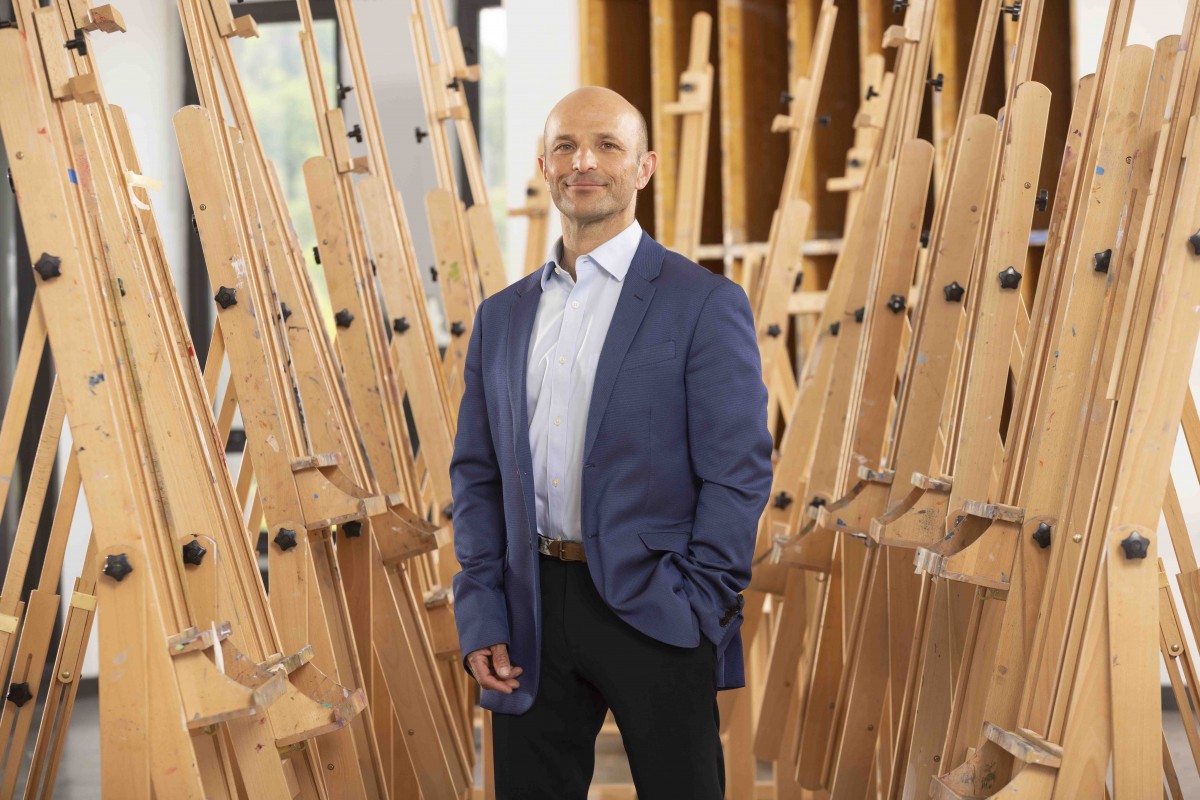The art of synergy: Meet the founding director of Harpur’s School of the Arts
Christopher Robbins brings a collaborative approach to new school within Harpur College

Art is often created through the combination of different elements and perspectives, even contradictory ones: motion and stillness, oil and water, wood and lathe, sound and silence, tension and release.
That same process can also unearth novel solutions for other complex knots. Take Ghana ThinkTank, an international artist collective co-founded by Christopher Robbins in which focus groups based in “developing” countries are asked to identify solutions to issues in the so-called “First World.” Robbins and his collaborators deliberately work with groups that are at odds to find shared goals and outcomes — such as asking recently deported immigrants in Tijuana to solve issues posed by members of anti-immigrant civilian border patrols like the Minutemen.
“You take something you supposedly know but make it new and alien to you. It constantly forces you to rethink your assumptions,” explains Robbins, who joined Harpur College this summer as founding director of its new School of the Arts. Most recently director of the School of Art & Design at Purchase College, SUNY, his career has spanned the globe.
He taught at Purchase since 2010, and prior to that at the Rhode Island School of Design. He was also the first multimedia specialist at the University of the South Pacific, based in Fiji; the college spans 30 million square kilometers of ocean and 15 different island nations with many different languages and cultures.
Robbins’ creative work spans several fields, including sculpture and public art. He has extensive experience working in nonprofit organizations, including developing a residential land trust in Detroit that uses art to fight the impact of gentrification on communities, and also served in the U.S. Peace Corps in Benin, West Africa, as a rural community development worker.
From African villages to American Riad, the art and housing justice project under construction in Detroit, Robbins’ experiences taught him the importance of figuring out what people actually want and how to make that happen, he says.
“I thrive in new environments where I need to figure out the issues and opportunities, and my place in relation to them. I deliberately seek solutions from unexpected places to create new partnerships, and work with people to find common cause,” he says. “I’ve gotten good at finding confluences.”
It’s a skillset that will prove handy for the School of the Arts, founded just this year. At its core, it combines the departments of cinema, art and design, art history, music and theatre — along with a wealth of interdisciplinary possibilities, from creative writing and the humanities to engineering and the sciences, and even the pharmaceutical and health sciences, Robbins anticipates.
“There’s so many different parts coming together,” he says. “The vibe when I was there was fantastic. It was clear that at every single level, from students to faculty and staff to the administration and the president, they all wanted this for similar reasons.”
Robbins was impressive throughout the search process, according to Harpur College Dean Celia Klin. His strength in building collaboration will prove beneficial in both shepherding a major renovation of the Fine Arts Building and taking Harpur’s arts programs into the future.
“Our new School of the Arts needs a founding director with a vision for the arts of the future, and who can create a synergy among the arts at Binghamton to realize that vision,” says Executive Vice President for Academic Affairs and Provost Donald Hall. “Christopher has the experience we were looking for and a clear understanding of what we want to accomplish at Binghamton as we bolster our support of the arts and establish new creative paths for our students.”
Outside of his director duties, Robbins will continue his work with Ghana ThinkTank, and is excited about the ways that Harpur College and the community can link with its network and process. He hopes to make an impact in the local community, too, by fundraising for a skate park — either expanding the one at Cheri A. Lindsey Memorial Park in the City of Binghamton, or starting a new one.
“Skateboarding is a great way for people of all ages to come together to express themselves and let out some energy, and the supportive communities that skate parks create are always fantastic investments for our future,” he says
